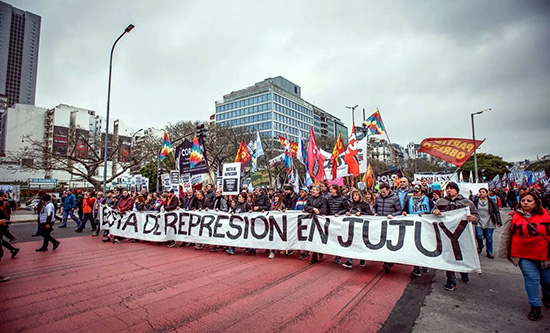
Thousands of people have taken to the streets of the northern province of Jujuy in Argentina, against the governor’s anti-democratic constitutional reform, low wages and police repression.
On 20 June a partial constitutional reform was passed in Jujuy by the Constitutional Convention after barely a month of debate behind closed doors. The proposed changes included attacks on the right to protest and on freedom of speech, further concentration of state powers and revised legal mechanisms to enable the privatisation of indigenous land and resource extraction by corporations.
Jujuy is part of the ‘lithium triangle’, a region which holds more than 50% of the world’s lithium reserves. Mining resources such as lithium are adjacent to settlements of the indigenous community, the only inhabitants of the Altiplano, the most extensive high plateau on Earth outside Tibet. Lithium has become an important resource globally in the last 50 years, as it is an essential component of electric vehicle batteries and solar panels. Lithium demand is expected to grow by seven times over the next ten years. In the context of a global competition for lithium, this creates greater conflict between local communities and capitalists seeking to exploit this valuable raw material.
Members of the Constitutional Convention were elected on 7 May. Gerardo Morales, Secretary General of the right-wing Radical Civic Union (URC) and governor of Jujuy since 2015, was elected president of the Constitutional Convention and was granted special permission to assume both posts.
Although the Constitutional Convention should have involved 50 days of discussion, it played out over three weeks, and the reform was approved after just two ordinary sessions with alterations to 66 of the provincial Constitution’s 212 articles. These sessions were not public, minutes were not recorded and there was no hearing with social representatives or citizens. Furthermore, the reform will not be subject to popular vote, as is usual for reforms of this scale.
Since the start of Gerardo Morales’ governorship in 2015 he has cut back state support for education. Governor Morales had the leader of the Tupac Amaru Neighbourhood Organisation, Milagro Sala, arrested on flimsy pretexts; this is a social and political organisation that focuses on the provision of goods, services and rights to people unprotected by the state such as indigenous people, women and the unemployed. Gerardo Morales also provided logistical assistance for the US financing of the 2019 coup that deposed left-wing Bolivian President Evo Morales in a gambit to secure imperialist access to Bolivia’s lithium resources.
As presidential candidate of the UCR in general elections in October 2023, Gerardo Morales is using Jujuy as a testing ground for how he would rule if he became president of Argentina. Morales is representative of capitalism’s need for land plundering, exploitation and repression.
Since the beginning of June unionised teachers in Jujuy began to strike and march in the streets demanding better salaries, which rank amongst the lowest in the country. They were soon joined by indigenous people and other workers chanting ‘¡Abajo la reforma, arriba los salarios!’ (Down with the reform, up with wages!).
The reform particularly targets the rights of the province’s workers and its large indigenous community. One of its most incendiary changes was a series of mechanisms for regulating access to land. This could have resulted in untitled plots of land where indigenous people have lived for centuries being stolen, privatised and exploited for capitalist profits.
Another reform that angered Jujuy’s workers is the prohibition of roadblocks, one of the main tactics of peaceful protest that the indigenous community and workers around the country use to make their opposition heard.
Although street pressure caused two reforms involving indigenous rights and access to land to be withdrawn, restrictions on protesting and free expression remained, and protests were received with violence and police repression reminiscent of the darkest years of Argentinian history during the military dictatorship that ruled the country from 1976 to 1983.
Police and unidentifiable enforcers using unmarked vehicles stepped up arrests. They used rubber bullets and tear gas against the protesters. Mijael Lamas, 17, lost an eye when the police shot a rubber bullet at his head. Health workers, journalists and even an elected official have been arrested. The police arrested Natalia Morales, a Jujuy legislator with the Party of Socialist Workers, by dragging her by the limbs along the road. She was released a few days later, but people with lower profiles did not have the same luck. Over 60 people have been detained and over 170 injured since the mobilisations began, with some detainees not released until mid-July.
Protesters, from Buenos Aires to Chile and Brazil, held demonstrations in support of the people of Jujuy, while the Inter-American Commission on Human Rights, Amnesty International, and the United Nations High Commissioner for Human Rights have criticised the provincial government’s reform and repressive methods towards protesters.
Protests are still ongoing, and teachers and indigenous people are now joined by miners and other workers. Protests against the constitutional reform and the government’s repression have coincided with national protests commemorating 47 years since the Noche del Apagón, a series of power outages in Jujuy planned and financed by the agro-industrial company Ledesma during which detentions, torture and disappearances were carried by the military as part of their state terrorism under the dictatorship. Carlos Pedro Blaquier, president of Ledesma at the time, as well as many others involved in the preparation for the 1976 coup, remain unpunished to this day.
Luna Blue
FIGHT RACISM! FIGHT IMPERIALISM! 295 August/September 2023




